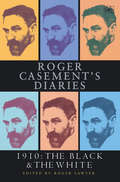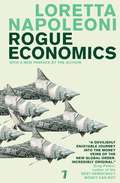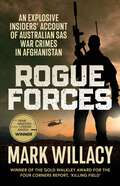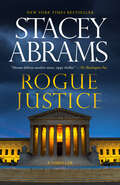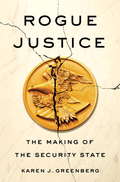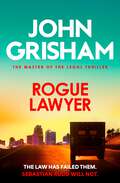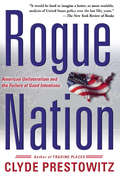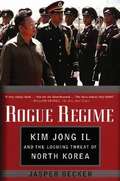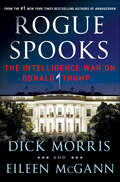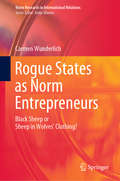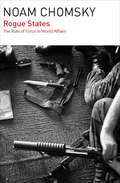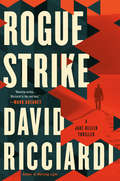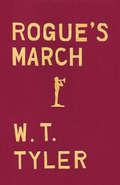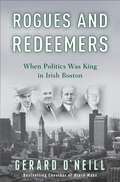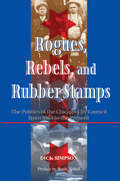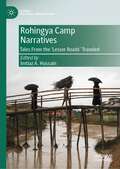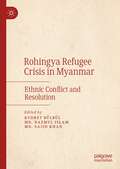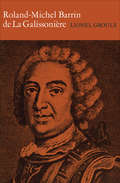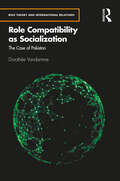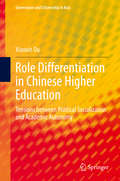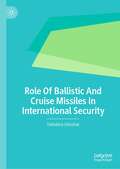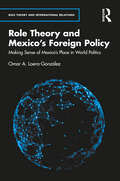- Table View
- List View
Roger Casement's Diaries: 1910:The Black and the White
by Roger SawyerBorn in Ireland in 1864 Roger Casement acted as British Consul in various parts of Africa (1895-1904) and Brazil (1906-11) where he denounced atrocities among Congolese and Putumayo rubber workers. knighted in 1911, He returned to Ireland, where as an ardent nationalist he attempted to enlist German help for the cause. He was hanged for high treason in London in 1916. A compulsive diary writer, his so-called 'Black' Diaries were finally released into the public domain in 1994. At the time of his trial, these diaries-detailing his promiscuous homosexual activities in Brazil-were used to condemn him and, subsequently, to poison his reputation. Published here for the first time-as are his more public 'White' Diaries of the same year-they not only offer the reader the opportunity to judge their authenticity-still a matter of heated debate-but they also take us deep into the mind of the bravest, most selfless and practical humanitarian of the Edwardian age.
Roger Williams (American Lives)
by Elizabeth RaumRoger Williams was the founder of Rhode Island. This biography spanning his lifetime concentrates on the work he did to make life better for himself and other Americans.
Rogue Diplomats: The Proud Tradition of Disobedience in American Foreign Policy (Cambridge Studies in US Foreign Relations)
by Seth JacobsMany of America's most significant political, economic, territorial, and geostrategic accomplishments from 1776 to the present day came about because a U.S. diplomat disobeyed orders. The magnificent terms granted to the infant republic by Britain at the close of the American Revolution, the bloodless acquisition of France's massive Louisiana territory in 1803, the procurement of an even vaster expanse of land from Mexico forty years later, the preservation of the Anglo-American 'special relationship' during World War I—these and other milestones in the history of U.S. geopolitics derived in large part from the refusal of ambassadors, ministers, and envoys to heed the instructions given to them by their superiors back home. Historians have neglected this pattern of insubordination—until now. Rogue Diplomats makes a seminal contribution to scholarship on U.S. geopolitics and provides a provocative response to the question that has vexed so many diplomatic historians: is there a distinctively “American” foreign policy?
Rogue Economics
by Loretta NapoleoniWhat do Eastern Europe's booming sex trade, America's subprime mortgage lending scandal, China's fake goods industry, and celebrity philanthropy in Africa have in common? With biopirates trolling the blood industry, fish-farming bandits ravaging the high seas, pornography developing virtually in Second Life, and games like World of Warcraft spawning online sweatshops, how are rogue industries transmuting into global empires? And will the entire system be transformed by the advent of sharia economics? With the precision of an economist and the narrative deftness of a storyteller, syndicated journalist Loretta Napoleoni examines how the world is being reshaped by dark economic forces, creating victims out of millions of ordinary people whose lives have become trapped inside a fantasy world of consumerism. Napoleoni reveals the architecture of our world, and in doing so provides fresh insight into many of the most insoluble problems of our era.
Rogue Empires: Contracts and Conmen in Europe's Scramble for Africa
by Steven PressIn the 1880s Europeans grabbed vast swaths of the African continent, using documents, not guns, as their weapon of choice. Steven Press follows a paper trail of questionable contracts to discover the confidence men who exploited a loophole in international law to assert sovereignty over lands, and whose actions touched off the Scramble for Africa.
Rogue Forces
by Mark WillacyRogue Forces is the explosive first insiders&’ story of how some of Australia&’s revered SAS soldiers crossed the line in Afghanistan, descending from elite warriors to unlawful killers. Mark Willacy, who won a Gold Walkley for exposing SAS war crimes, has penetrated the SAS code of silence to reveal one of the darkest chapters in our country&’s military history. Willacy&’s devastating award-winning Four Corners program, &‘Killing Fields&’ captured on film for the first time a war crime perpetrated by an Australian: the killing of a terrified, unarmed Afghan man in a field by an SAS soldier. It caused shockwaves around the world and resulted in an Australian Federal Police war crimes investigation. It also sparked a new line of investigation by the Brereton inquiry, the independent Australian Defence Force inquiry into war crimes in Afghanistan. It was a game changer. But for Willacy, it was just the beginning of a much bigger story. More SAS soldiers came forward with undeniable evidence and eyewitness testimony of other unlawful killings, and exposed a culture of brutality and impunity. Rogue Forces takes you out on the patrols where the killings happened. The result is a gripping character-driven story that embeds you on the front line in the thick of the action as those soldiers share for the first time what they witnessed. Willacy also confronts those accused about their sides of the story. At its heart, Rogue Forces is a story about the true heroes who had the courage to come forward and expose the truth. This is their story. A story that had to be told.
Rogue Justice: A Thriller (Avery Keene #2)
by Stacey AbramsNEW YORK TIMES BESTSELLER • The #1 bestselling author of While Justice Sleeps returns with another riveting and intricately plotted thriller, in which a blackmailed federal judge, a secret court and a brazen murder may lead to an unprecedented national crisis."Abrams delivers another smart, zippy thriller." —Washington Post"A thoroughly compelling take on the machinations of Washington and those covetous of power." —New York MagazineSupreme Court clerk Avery Keene is back, trying to get her feet on solid ground after unraveling an international conspiracy in While Justice Sleeps. But as the sparks of Congressional hearings and political skirmishes swirl around her, Avery is approached at a legal conference by Preston Davies, an unassuming young man and fellow law clerk to a federal judge in Idaho. Davies believes his boss, Judge Francesca Whitner, was being blackmailed in the days before she died. Desperate to understand what happened, he gives Avery a file, a burner phone, and a fearful warning that there are highly dangerous people involved. Another shocking murder leads Avery to a list of names – all federal judges – and, alarmingly, all judges on the FISA Court (the United States Foreign Intelligence Surveillance Court), also known as America&’s "secret court." It is this body which grants permission to the government to wiretap Americans or spy on corporations suspected of terrorism. As Avery digs deeper, she begins to see a frightening pattern – and she worries that something far more sinister may be unfolding inside the nation&’s third branch of government. With lives at stake, Avery must race the clock and an unexpected enemy to find the answer.Drawn from today&’s headlines and woven with her unique insider perspective, Stacey Abrams combines twisting plotlines, wry wit, and clever puzzles to create another immensely entertaining suspense novel.
Rogue Justice: The Making of the Security State
by Karen J. GreenbergThe definitive account of how America's War on Terror sparked a decade-long assault on the rule of law, weakening our courts and our Constitution in the name of national security.The day after September 11, President Bush tasked the attorney general with preventing another terrorist attack on the United States. From that day forward, the Bush administration turned to the Department of Justice to give its imprimatur to activities that had previously been unthinkable--from the NSA's spying on US citizens to indefinite detention to torture. Many of these activities were secretly authorized, others done in the light of day.When President Obama took office, many observers expected a reversal of these encroachments upon civil liberties and justice, but the new administration found the rogue policies to be deeply entrenched and, at times, worth preserving. Obama ramped up targeted killings, held fast to aggressive surveillance policies, and fell short on bringing reform to detention and interrogation.How did America veer so far from its founding principles of justice? Rogue Justice connects the dots for the first time--from the Patriot Act to today's military commissions, from terrorism prosecutions to intelligence priorities, from the ACLU's activism to Edward Snowden's revelations. And it poses a stark question: Will the American justice system ever recover from the compromises it made for the war on terror?Riveting and deeply reported, Rogue Justice could only have been written by Karen Greenberg, one of this country's top experts on Guantánamo, torture, and terrorism, with a deep knowledge of both the Bush and Obama administrations. Now she brings to life the full story of law and policy after 9/11, introducing us to the key players and events, showing that time and again, when liberty and security have clashed, justice has been the victim.From the Hardcover edition.
Rogue Lawyer: The suspenseful crime thriller from the number 1 Sunday Times bestselling author
by John GrishamTHE LAW HAS FAILED THEM. SEBASTIAN RUDD WILL NOT.Sebastian Rudd take the cases no one else wants.As a result, his last office was firebombed - either by drug dealers or cops. And things are about to get even more complicated.Arch Swanger is a criminal lowlife and the prime suspect in the abduction and presumed murder of the daughter of the assistant chief of police. When Rudd agrees to represent him, Swanger lets him in on a terrible secret.It's a secret Rudd wishes he never heard - and one that will threaten everything he holds dear.💥350+ million copies, 45 languages, 10 blockbuster films: JOHN GRISHAM IS THE MASTER OF THE LEGAL THRILLER💥Rogue Lawyer is a hit with readers: 'Brilliant and blistering!' ⭐ ⭐ ⭐ ⭐ ⭐ 'John Grisham at his very best' ⭐ ⭐ ⭐ ⭐ ⭐ 'A BRILLIANT book' ⭐ ⭐ ⭐ ⭐ ⭐ 'Fantastic!'⭐ ⭐ ⭐ ⭐ ⭐
Rogue Nation: American Unilateralism and the Failure of Good Intentions
by Clyde PrestowitzAmerica's democratic ideals have long been the hope of the world, but our allies increasingly see us as abandoning those ideals. It's not hard to understand why. In the months before 9/11, the United States walked away from a number of international treaties including the Kyoto Accord. After the attack, the United States turned a cold shoulder to NATO's offers to assist with the invasion of Afghanistan, unilaterally terminated the ABM treaty, and actively opposed the creation of an International Criminal Court. Then came the war on Iraq, begun despite the clear refusal of the United Nations Security Council to authorize an invasion. Obsessed with our own immediate military and economic security, we now deem institutions like NATO and the UN irrelevant. We have abandoned containment for a policy of preventive attacks on potential threats. More and more, we act alone, with little regard for the needs and goals of other nations. Rogue Nation is not an argument against American dominance or the exercise of American power. It's an argument against stupidity, arrogance, and ignorance in the exercise of power. Prestowitz explores the historical roots of the unilateral impulse and shows how it now influences every important area of American foreign policy. Even now, when the need for multilateral action has never been greater, we continue to act contrary to international law, custom, and our own best interests.
Rogue Regime: Kim Jong Il and the Looming Threat of North Korea
by Jasper BeckerWhat happens when a dictator wins absolute power and isolates a nation from the outside world? North Korea, ruled by Kim Jong Il, seems destined to survive and linger on for some time, a menace to its own people and to the rest of the world.
Rogue Spooks: The Intelligence War on Donald Trump
by Dick Morris Eileen McGannThis is the story of an attempted coup d'étatby rogue intelligence agents. The goal: to overthrow the presidency of Donald Trump and subvert the will of the electorate.Donald Trump's first 100 days in office were roiled by allegations of treasonous contacts between his campaign team and the Kremlin to rig the election. These outrageous charges first surfaced in the notorious “Trump Dossier,” an unverified document of suspect provenance, full of wild and salacious accusations. This dossier—filled with little more than gossip, rumor, and innuendo—was compiled by Christopher Steele, a former British intelligence operative who teamed up with the FBI and anti-Trump partisans. Hillary Clinton supporters paid for Steele’s work. When no news media would publish the unverified dossier, the ex-spook enlisted the help of a former UK ambassador to Russia, who arranged in turn for a former U.S. assistant secretary of state to get the document to Senator John McCain, in the hope that he would then bring it to FBI Director James Comey’s attention. McCain did just that.Comey himself played a critical role in the dossier ultimately going public, giving a confidential summary to President Obama and congressional leaders. It was immediately leaked by rogue spooks in order to demean, destabilize, and destroy Donald Trump’s nascent presidency.The dossier and this mythical intelligence are the basis for the phony claims about a Russia-Trump collusion to steal the election. No proof was found. No substantiation uncovered. Even Comey told Trump he was not under investigation for the Russian meddling charges.But that didn’t end the leaks or the allegations. Working in concert with liberal news outlets, these rogue spooks have formed a new Intel/Media complex that threatens our democracy. Rogue Spooks will reveal how it works.Readers of Rogue Spooks, from bestselling authors Dick Morris and Eileen McGann, will be shocked to learn the truth about the false accusations against President Trump in the flawed dossier. They’ll be interested to know how leaks to the media fueled the phony scandal, and how intelligence agencies tried to use the newly appointed special prosecutor to oust President Trump.
Rogue States as Norm Entrepreneurs: Black Sheep or Sheep in Wolves' Clothing? (Norm Research in International Relations)
by Carmen WunderlichThis book investigates whether so-called rogue states – assumed antagonists of a Western-liberal world order – could also act as norm entrepreneurs by championing the genesis and evolution of global norms. The author explores this issue by analyzing the arms control policies of the Islamic Republic of Iran. A comparison with the prototypical norm entrepreneur Sweden and the Democratic People’s Republic of North Korea – a notorious norm-breaker – reveals interesting insights for norm research: Apparently, norm entrepreneurship manifests itself in different degrees and phases of the norm life cycle. The finding that Iran indeed acts as a norm entrepreneur in some cases also sheds light on those factors that might account for the success or failure of norm advocacy. Lastly, the book offers a new perspective on “rogue states”, by not only regarding them as irrational antagonists of the current world order, but also as legitimate participants in a discourse on what the ruling order should look like. This book will appeal to scholars interested in critical norm research in international relations.“This book offers cutting-edge norm research, highlighting how norm-breakers can function as norm-makers."Maria Rost Rublee, Associate Professor of International Relations, Monash University (Australia)“So-called ‘rogue states’ are typically understood as norm breakers, but Carmen Wunderlich makes a persuasive conceptual case backed by empirical research that we need to consider the extent to which they are in fact norm entrepreneurs in their own right. In an era characterized by much concern over the status of liberal norms, this is a very timely study.”Richard Price, Department of Political Science, The University of British Columbia (Canada)"At a time when the world order is under pressure, this cutting-edge analysis of how dissatisfied states challenge existing global norms illuminates a topic crucial to understanding contemporary international relations."Nina Tannenwald, Director, Watson Institute for International and Public Affairs, Brown University (Rhode Island USA)
Rogue States: The Rule of Force in World Affairs (Chomsky Perspectives Ser. #No. 13)
by Noam ChomskyThe bestselling author and activist &“has delivered another impressive argument that the U.S. flouts international law when it finds it convenient to do so&” (Publishers Weekly). In this still-timely classic, Noam Chomsky argues that the real &“rogue&” states are the United States and its allies. Chomsky turns his penetrating gaze toward US involvement in the Middle East, Southeast Asia, the Caribbean, and Latin America to trace the enduring combined effects of military domination and economic imperialism on these regions. &“Noam Chomsky is like a medic attempting to cure a national epidemic of selective amnesia . . . [Rogue States is] a timely guide to the tactics that the powerful employ to keep power concentrated and people compliant . . . Chomsky&’s work is crucial at a time when our empire perpetually disguises its pursuit of power under the banners of &‘aid,&’ &‘humanitarian intervention,&’ and &‘globalization.&’ Americans have to begin deciphering the rhetoric. Chomsky&’s a good place to start.&” —The Village Voice &“World-famous MIT linguist Chomsky has long kept up a second career as a cogent voice of the hard left, excoriating American imperialism, critiquing blinkered journalists and attacking global economic injustice.&” —Publishers Weekly &“Nothing escapes [Chomsky&’s] attention . . . [Rogue States is] wonderfully lucid.&” —PeaceWork Praise for Noam Chomsky &“Chomsky is a global phenomenon . . . perhaps the most widely read voice on foreign policy on the planet.&” —The New York Times Book Review &“The conscience of the American people.&” —New Statesman &“One of the radical heroes of our age . . . a towering intellect . . . powerful, always provocative.&” —The Guardian
Rogue Strike (A Jake Keller Thriller #2)
by David RicciardiJake Keller finds himself in a familiar position—on the run for his life and desperate to find the shadowy figures behind a global conspiracy.CIA agent Jake Keller and his partner, Curt Roach, are in Yemen on an important mission. They've been tipped off to a secret meeting of top al Qaeda leaders. The plan is to interrupt the meeting with a few unexpected visitors—a pair of Hellfire missiles from an orbiting drone. But the drone stops responding to their signals and soon disappears over the horizon. When next seen, the drone is attacking innocent pilgrims in Mecca. Jake and Curt are staggered. The U.S. government is desperate to disavow this atrocity. Who better to blame than a couple of rogue CIA agents? With all the governments of the Middle East looking for them and no help from their own side, they are in a desperate race to stay ahead of the mob and find out who's actually behind the crime.
Rogue's March
by W. T. TylerA story of a coup d'etat in Central Africa, Rogue's March is about the men on all sides of the conflict, men caught up in events beyond their control or understanding.
Rogues and Redeemers: When Politics Was King in Irish Boston
by Gerard O'NeillFrom the bestselling coauthor of Black Mass, a behind-the-scenes portrait of the Irish power brokers who forged and fractured twentieth-century Boston. Rogues and Redeemers tells the hidden story of Boston politics--the cold-blooded ward bosses, the smoke-filled rooms, the larger-than-life pols who became national figures: Honey Fitz, the crafty stage Irishman and grandfather to a president; the pugilistic Rascal King, Michael Curley; the hectored Kevin White who tried to hold the city together during the busing crisis; and Ray Flynn, the Southie charmer who was truly the last hurrah for Irish-American politics in the city. For almost a century, the Irish dominated Boston politics with their own unique, clannish brand of coercion and shaped its future for good and ill. Former Boston Globe investigative reporter Gerard O'Neill takes the reader through the entire journey from the famine ships arriving in Massachusetts Bay to the wresting of power away from the Brahmins of Beacon Hill to the Title I wars of attrition over housing to the rending of the city over busing to the Boston of today--which somehow through it all became a modern, revitalized city, albeit with a growing divide between the haves and have-nots. Sweeping in its history and intimate in its details, Rogues and Redeemers echoes all the great themes of The Power Broker and Common Ground and should take its place on that esteemed shelf as a classic, definitive epic of a city.
Rogues, Rebels, And Rubber Stamps: The Politics Of The Chicago City Council, 1863 To The Present (Urban Policy Challenges Ser.)
by Dick SimpsonIn Rogues, Rebels, and Rubber Stamps, Dick Simpson challenges and recasts current theories of Regime Politics as he chronicles the dramatic story of the civic wars in the Chicago City Council since the civil war. At the same time, the author provides a window into the broader struggle for democracy and justice.Simpson points out that through analyzing city council floor fights, battles at the ballot box, and street demonstrations, one can begin to see certain patterns of conflict emerge. These patterns demonstrate that before the Great Depression, fragmented city councils were dominant. The author also discusses how since the Democrats seized control of Chicago government after the Great Depression, Rubber Stamp City Councils have been predominant, although they have been punctuated by brief eras of council wars and chaos. This book is important for anyone wanting to understand the nature of these battles as a guideline for America's future, and is well suited for courses in urban politics, affairs and history.Rogues, Rebels, and Rubber Stamps received an Honorable Mention for the 2001 Society of Midland Authors Book Award for Adult Non-Fiction.
Rohingya Camp Narratives: Tales From the ‘Lesser Roads’ Traveled (Global Political Transitions)
by Imtiaz A. HussainThis book presents thirteen chapters which probe the “tales less told” and “pathways less traveled” in refugee camp living. Rohingya camps in Bangladesh since August 2017 supply these “tales” and “pathways”. They dwell upon/reflect camp violence, sexual/gender discrimination, intersectionality, justice, the sudden COVID camp entry, human security, children education, innovation, and relocation plans. Built largely upon field trips, these narratives interestingly interweave with both theoretical threads (hypotheses) and tapestries (net-effects), feeding into the security-driven pulls of political realism, or disseminating from humanitarian-driven socioeconomic pushes, but mostly combining them. Post-ethnic cleansing and post-exodus windows open up a murky future for Rohingya and global refugees. We learn of positive offshoots (of camp innovations exposing civil society relevance) and negative (like human and sex trafficking beyond Bangladeshi and Myanmar borders), as of navigating (a) local–global linkages of every dynamic and (b) fast-moving current circumstances against stoic historical leftovers.
Rohingya Refugee Crisis in Myanmar: Ethnic Conflict and Resolution
by Kudret Bülbül Md. Nazmul Islam Md. Sajid KhanThis book discusses the current reality and the future of ethnic Rohingyas in Myanmar. It presents Myanmar’s history, policy, politics and, most importantly, while focusing on Rohingya ethnic conflict, presents a resolution by looking at the global and regional policies and politics of South Asia and South-East Asia. The recent coup unfolded in Myanmar and the detention of the democratic leaders has surprised the world with its subsequent emergency declaration in 2021, thus making this book relevant and well-timed. Eventually, the book offers an account of a previously little known, yet much-discussed role of media, international actors, human trafficking, and humanitarian-based resolution for Rohingya refugee crisis. It shows a new perspective in the post-Rohingya influx era of Bangladesh and the neighbouring countries.
Roland-Michel Barrin de La Galissoniere 1693-1756
by Lionel GroulxLa Galissionière was the most remarkable of the governors of New France in the eighteenth century, although he spent only a short time there (1747 to 1749). He stood out above all through his intellectual qualities: his mind was brilliant, wide-ranging, and nourished by a creative imagination which was fertile in new ideas and rapid solutions. Roland-Michel Barrin de la Galissonière was born at Rochefort, France, in November 1693 to a family which included in its ranks members of the parlement, intendants, wealthy merchants, and powerful officials. At 17 he joined the navy, and after a successful career was sent to Canada at the age of 54 as "commander-in-chief of the colony," at a time when it was in great peril. Louisbourg and Acadia had been lost to the English; the Gulf of St. Lawrence was infested with English privateers; Quebec was under constant threat of invasion from the south, and its vital alliance with the Indians was proving to be shaky. The western fur trading were ineffective because of the wartime interruption of commerce. La Galissonière grasped the many problems quickly and clearly, and set out to restructure the colony, to join its badly fitting parts together in an organized whole. The attitude of his superiors at home was a major difficulty. Neither Vaudreuil nor Beauharnois, his predecessors, had been able to jolt the minister and the king out of their apathy concerning the colony; La Galissonière made the alarm they had sounded timidly ring out in the offices of Versailles. He attempted desperately the impossible recovery they had not known how to carry out in time. This biographical essays paints a vivid and forceful picture of New France on the eve of the Seven Years' War.
Role Compatibility as Socialization: The Case of Pakistan (Role Theory and International Relations)
by Dorothée VandammeIn Role Compatibility as Socialization, Dorothée Vandamme examines Pakistan’s socialization process in terms of role compatibility in the 2008-2018 period. Adopting an Interpretative phenomenological analysis (IPA) method of analysis, Vandamme builds on role theory to develop a theory of socialization as role compatibility to explain the dynamics of Pakistan’s (dys)functioning position and its status-seeking process as a fully functioning member of the international system. Specifically, she focuses on how Pakistani civilian and military leaders define their country’s positioning towards India, the United States and China. In doing so, she traces the link between domestic role contestation at the country’s inception and the resulting domination of the military’s conception of their country, state identity, how it projects itself externally and how it is received by others. Departing from strictly structural or agent-oriented explanations, Vandamme expertly demonstrates Pakistan’s perceived role compatibility with significant others and underlines the causality between state identity, foreign policy behavior and socialization. Role Compatibility as Socialization will be of interest to graduate students and researchers who work on and with role theory and socialization theory, and for those with a research interest on South Asia.
Role Differentiation in Chinese Higher Education: Tensions between Political Socialization and Academic Autonomy (Governance and Citizenship in Asia)
by Xiaoxin DuThis book examines tensions between the Chinese state and Chinese universities. It looks at the state’s demand for political socialization as a restriction on university autonomy and the university’s promotion of academic development through promoting academic freedom and fostering critical thinkers, using Jour University in PRC, as a case study.The book focuses on the dynamics and complexity of the interplay between the state, universities, faculty, staff and students in the process of socialization through political education and academic affairs. Theories on political socialization and higher education guide this study. As universities’ socio-political task of imbuing students with a certain type of ideology coexists with their role of promoting university autonomy, examining China’s higher education system provides important insights as different players’ interaction. These present a dynamic picture of role differentiation as a strategy to cope with a politically restricted autonomy, which challenges some common stereotypes that have been put on Chinese universities within the global community.
Role Of Ballistic And Cruise Missiles In International Security
by Debalina GhoshalThe book attempts to understand the myriad roles of ballistic and cruise missiles in international security. They are for combat purpose, deterrence, coercive diplomacy and power and prestige of a state. The book also studies missile developments across the world. The book also aims to fathom the various possibilities to reduce the threat from missile systems.
Role Theory and Mexico's Foreign Policy: Making Sense of Mexico’s Place in World Politics (Role Theory and International Relations)
by Omar A. Loera-GonzálezRole Theory and Mexico’s Foreign Policy examines why Mexico has an unusual foreign policy for a middle-power country. Using a series of case studies to show how role conflict has operated in Mexico’s foreign policy, Omar Loera-González studies three specific settings where Mexico could have displayed middle-power behaviour. First, he analyses Mexico’s controversial membership and performance in the Iraq crisis within the Security Council of the United Nations from 2002 to 2003. The second case study examines Mexico’s ambition to display a regional leadership role in regional multilateral bodies like the Community of Latin American and Caribbean States (CELAC) and the Pacific Alliance (PA). In the third and final case study, Loera-González focuses on Mexico’s engagement in human rights and democracy promotion. Conflicting expectations from several actors – domestic and external – have led to a foreign policy contradictory to what is expected for a country with Mexico's material capabilities and its foreign policy objectives. This book will be of interest to graduate students and researchers who work on and with foreign policy analysis and role theory, or to those with a research interest on Mexico.
